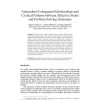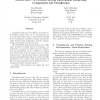132
click to vote
ATAL
2006
Springer
15 years 5 months ago
2006
Springer
In this paper we propose a formalism for symbolic negotiation. We regard symbolic negotiation as cooperative problem solving (CPS), which is based on symbolic reasoning and is ext...
132
click to vote
C5
2004
IEEE
15 years 5 months ago
2004
IEEE
information technologies as "the ability to reformulate knowledge, to express oneself creatively and appropriately, and to produce and generate information (rather than simply...
112
click to vote
GRC
2007
IEEE
15 years 6 months ago
2007
IEEE
Granular computing is not only a computing model for computer-centered problem solving, but also a thinking model for human-centered problem solving. Some authors have presented t...
110
click to vote
AIED
2009
Springer
15 years 6 months ago
2009
Springer
We explored the complex interplay between students' affective states and problem solving outcomes. We conducted a study where 41 students solved 28 analytical reasoning proble...
139
click to vote
ECAI
1990
Springer
15 years 6 months ago
1990
Springer
In case-based reasoning (CBR) a problem is solved by matching the problem description to a previously solved case, using the past solution in solving the new problem. A case-based...
133
click to vote
MAAMAW
1994
Springer
15 years 6 months ago
1994
Springer
One objective of distributed artificial intelligence research is to build systems that are capable of cooperative problem solving. To this end, a number of implementation-oriented ...
113
click to vote
EWCBR
1993
Springer
15 years 6 months ago
1993
Springer
Problem solving in weak theory domains should compensate for the lack of strong theories by combining the various other knowledge types involved. Such methods should be able to eff...
137
click to vote
VISUALIZATION
1993
IEEE
15 years 6 months ago
1993
IEEE
Visualization has proved an e ective tool in the understanding of large data sets in computational science and engineering. There is growing interest today in the development of p...
101
click to vote
HICSS
1994
IEEE
15 years 6 months ago
1994
IEEE
Our research goal is to design systems that enable humans to teach tedious, repetitive, simple tasks to a computer. We propose here a learner/problem solver architecture for such ...
110
click to vote
AUSAI
1997
Springer
15 years 6 months ago
1997
Springer
Engineering problem solving requires both domain knowledge and an understanding of how to apply that knowledge. While much of the recent work in qualitative physics has focused on...



